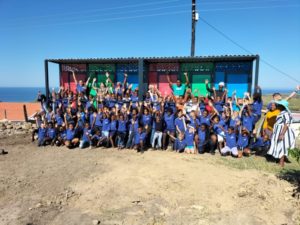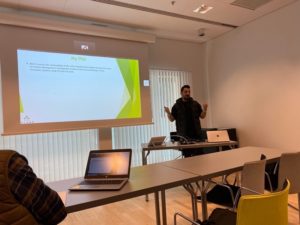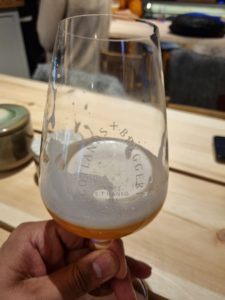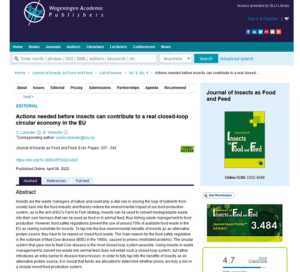Den 13 april hölls ett seminarium om Hur fett ska pressas in i en hållbar matframtid (på engelska) organiserad av TABLE och SLU Future Food. Cecilia presenterade om användningen av insekter för produktion av fett. Det visade sig att hennes insekter är rätt bra på att producera fett. Kan de kanske användas för att minska fettklyftan? Fettklyftan är klyftan mellan hur fett som behövs för att säkerställa mänsklighetens näringsbehov och hur mycket som faktiskt produceras. Om du vill vetta mera om detta, lyssna på seminariet.
Author: Anastasija Vasiljev
Cecilia joined TABLES seminar on How to squeeze fat into a sustainable food future
On the 13th of April a seminar on How to squeeze fat into a sustainable food future was organised by TABLE and SLU Future Food. Cecilia presented on using insects for fat production. Turns out her insects actually are quite good at synthesising fat; could they play a role in closing the fat gap? The fat gap is the gap between the total amount of fat needed for humanities nutritional needs and how much that is actually being produced. If you want to find out more about this, have a listen to the seminar.
Cecilia presenterar hur insekter kan länka avfallshantering och livsmedelsproduktion
Den 7 april presenterade Cecilia i SLUs seminarieserie Värt att veta om hur insekter kan länka avfallshantering med livsmedelsproduktion. Vårens presentationer i Värt att veta-serien kan ses här.
Cecilia presented how insects can be used to link waste management with food production
On the 7th of April Cecilia held a presentation on the SLU lunch seminar series Worth knowing about how waste management can be linked with food production with the help of Insects. The spring lectures in the series can be seen here.
Jenna joins the Swedish Tech Delegation to South Africa
Jenna Senecal joined the Swedish Tech Delegation to Cape Town, South Africa during the end of April 2022. This was part of Cape Town / Stockholm Connect, which is an internationalization project and co-creation platform where the goal is to strengthen tech and investor ties between Sweden and South Africa. During the week, Jenna met with other Swedish companies looking at establishing in South Africa and several South African startups looking at their growth potential.
A highlight for Jenna was meeting Birger Lundgren and Michèle Spooner who are working hard to bring affordable and sustainable sanitation to schools (as a start!).

Abdulhamid Aliahmad’s one-year follow-up seminar

On the 20th of April, Abdulhamid (Abood) Aliahmad had his one-year follow-up seminar.The presentation focused on the findings of the first study and inputs from the second study.
The first study focuses on evaluating whether the current state of knowledge concerning urine recycling technologies is sufficient to facilitate upscaling development and increased diffusion. Knowledge development and diffusion is a key function in the development of technological innovation systems (TIS). The study proposes a multi-criteria framework, together with bibliometric analysis to conduct such evaluation. The second study will follow up on this one examining other functions of the TIS.
He preliminary concluded that urine recycling TIS has the tendency for strong publication rate growth and diffusion between countries. However, the function still has insufficiency in some criteria. The analysis identified the lack of innovation in scientific research and the lack of diversification of emerging technologies into the TIS as weak elements. The frequency of research publication and pilot-scale implementations on each technology shall be higher.
He also included the proposed approaches for his next two studies. The seminar ended with many interesting questions and discussions.
If you want to know more about his research, click here.
Beer Tasting from Urine-fertilized Barley
 The SLU Drying team travelled to Gotland join Jenna Senecal (Sanitation360), Johannes Obermeier (Brewmaster, Gotlands Bryggeri), and the Science Park Gotland team to take part in the tasting of beer brewed at Gotlands Bryggeri. This special event evaluated the quality of barley that was grown last summer (2021) on Gotland with urine fertilizer. The Master Brewer was happy with the results!
The SLU Drying team travelled to Gotland join Jenna Senecal (Sanitation360), Johannes Obermeier (Brewmaster, Gotlands Bryggeri), and the Science Park Gotland team to take part in the tasting of beer brewed at Gotlands Bryggeri. This special event evaluated the quality of barley that was grown last summer (2021) on Gotland with urine fertilizer. The Master Brewer was happy with the results!
This is part of a three year project called Växtnäringskretslopp till uthållig ölproduktion (N2 Brew for short) that is looking into the service chain of recycling urine as a fertilizer. Urine contains the same nutrients used to grow the food that we consume – in better managing the natural resource found in our wastewater, we can build a circular economy while protecting water quality. This beer is not for sale, but keep posted about how the next brew from 2022 barley harvest preforms.
Ledare i tidskriften Insects as Food and Feed Vol. 8, No. 4, 2022
Denna månad publicerar kretsloppstekniks Cecilia Lalander och Björn Vinnerås en ledare i tidskriften Journal of Insects as Food and Feed om de hinder som står i vägen för att förverkliga en insektsbaserat slutet cirkulärekonomiskt kretslopp i EU idag. Möjligheten att skriva en ledare i denna tidskrift kommer sig av att Cecilia är biträdande redaktörer för tidskriften. Läs ledaren om du är intresserad av att ta reda på mer om vad vi tror krävs för att möjliggöra ett cirkulärt insektsbaserad livsmedelssystem i EU.

Editorial in Journal of Insects as Food and Feed Vol. 8, No. 4, 2022
This month Kretsloppsteknik’s Cecilia Lalander and Björn Vinnerås published an editorial in Journal of Insects as Food and Feed about the hindrances that exist in the EU that prevent a true insect based closed-loop circular economy in the EU. The opportunity to write an editorial in JIFF comes as of Cecilia being one of the associated editors of the journal. Please, read the full editorial if you want to find out what actions we believe are needed for achieving a circular insect food production system in the EU.

EWB mini-series on Sustainable Sanitation Solutions
This Friday, on 8th of April, Engineers Without Borders (EWB) is hosting its 1st seminar as a part of mini-series that focus on Sustainable Sanitation Solutions. Here, Håkan Jönsson and Jennifer McConvile will talk about safe and sustainable ways to recover nutrients, water and energy from sanitation systems. The seminar will take place at SLU but can also be attended digitally.

If you are interested in finding out more about EWB and upcoming seminar(s), click here.
